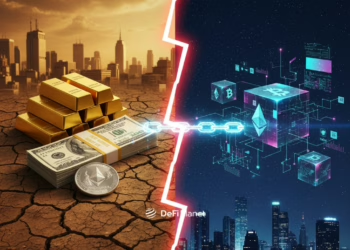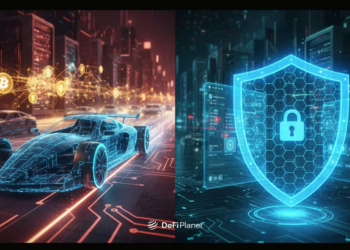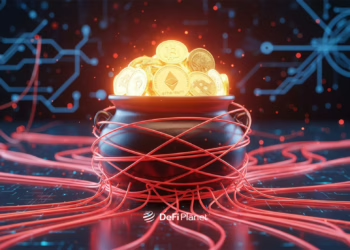Cloud mining is the next best thing to milk for potential crypto miners. It offers a unique way to participate in cryptocurrency mining while sidestepping the typical hurdles like high electricity costs, equipment maintenance, and technical expertise.
In a previous article, we discussed everything you need to know about cloud mining and how you can get started. Now, in this article, we’ll address the common questions you might have about this concept. Let’s get to it
Which Crypto Tokens Can You Cloud Mine?
Cloud mining is an option for several crypto tokens, but not all. Here’s a list of some tokens that you readily find cloud mining service providers for.
- Bitcoin
- Bitcoin Gold
- Ethereum
- Vertcoin
- Monero (XMR)
- ZCash
- Ravencoin (RVN)
- Haven Protocol (XHV)
- Ethereum Classic
- Litecoin (LTC)
- Monacoin (MONA)
Pool Mining vs Cloud Mining: What’s the Difference?
Pool mining happens when people join forces to increase their chances of mining cryptocurrency. On the flip side, cloud mining involves paying a service to do the mining for you, and you receive the rewards.
Cloud mining eliminates the need for hardware setup and maintenance, making it accessible even to those without technical skills.
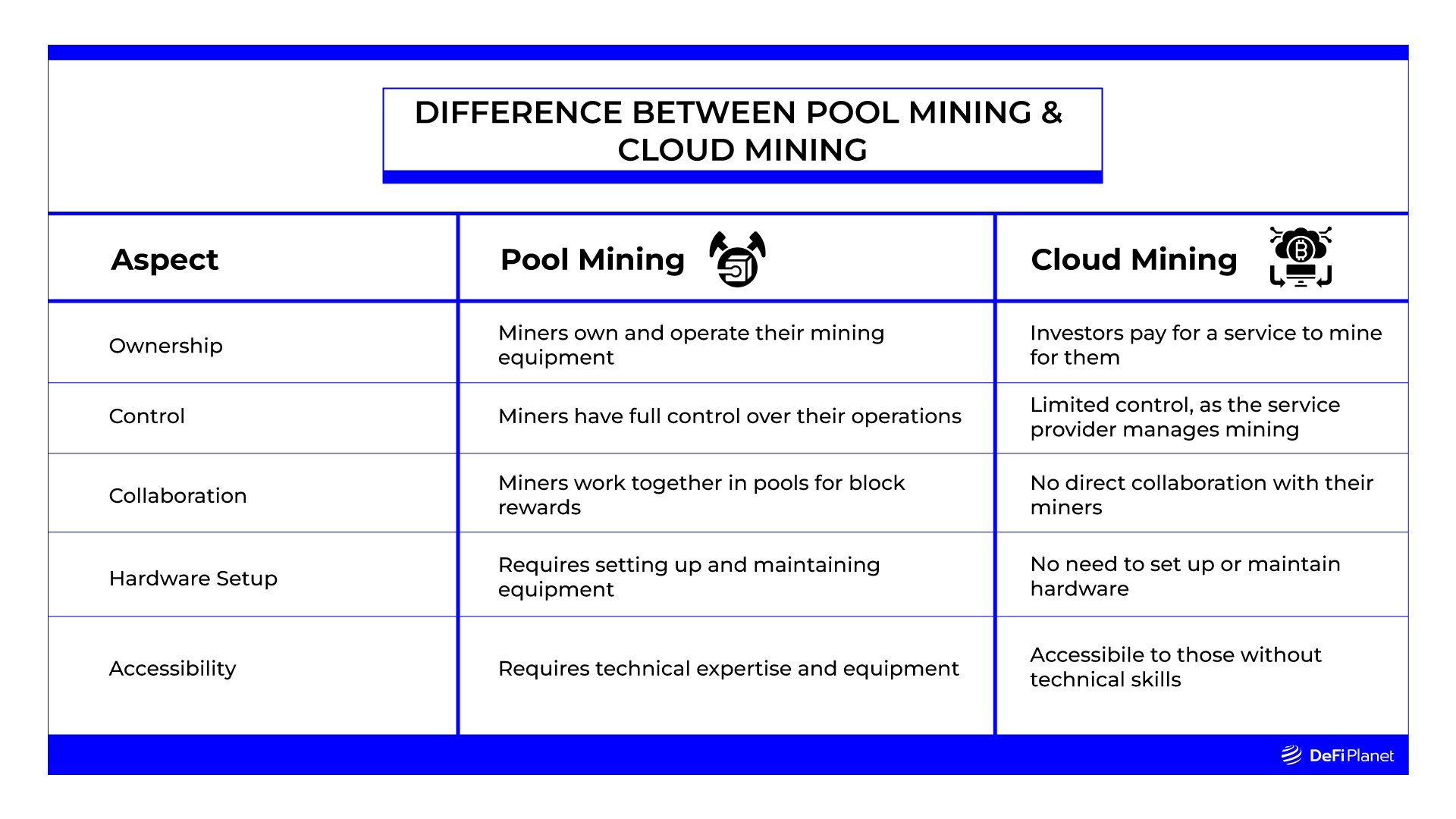
In pool mining, you still need your own mining equipment and the knowledge to operate it. The advantage is that you collaborate with other miners to mine a block, but you bear the full computational power burden.
Pool mining offers efficiency and regular payouts, but you share rewards with other pool members. Cloud mining provides convenience, flexibility, and potentially higher rewards, but it means giving up control and facing possible scam risks.
Is Cloud Mining Safe?
Cloud mining is safe if you choose a reputable platform. However, entrusting your mining to a third party involves risks. To minimize these risks, conduct thorough research, opt for well-established platforms, and prioritize security measures.
Does Cloud Mining Damage Your Phone?
No, cloud mining doesn’t harm your phone. Running mining software can consume a lot of power, drain the battery, and cause the phone to heat up, potentially affecting the battery and other components. However, you won’t be running any mining software on your phone because you’ve outsourced the mining to a cloud service.
In summary, cloud mining won’t directly harm your phone, but it’s best to avoid using your phone for mining due to its negative impacts on performance, battery life, and potential costs.
What Are the Risks of Cloud Mining?
Cloud mining is a viable option for individuals seeking to invest in cryptocurrencies without the technical complexities of traditional mining. However, it’s essential to understand the potential risks and rewards associated with cloud mining. Here are some of the risks to consider:
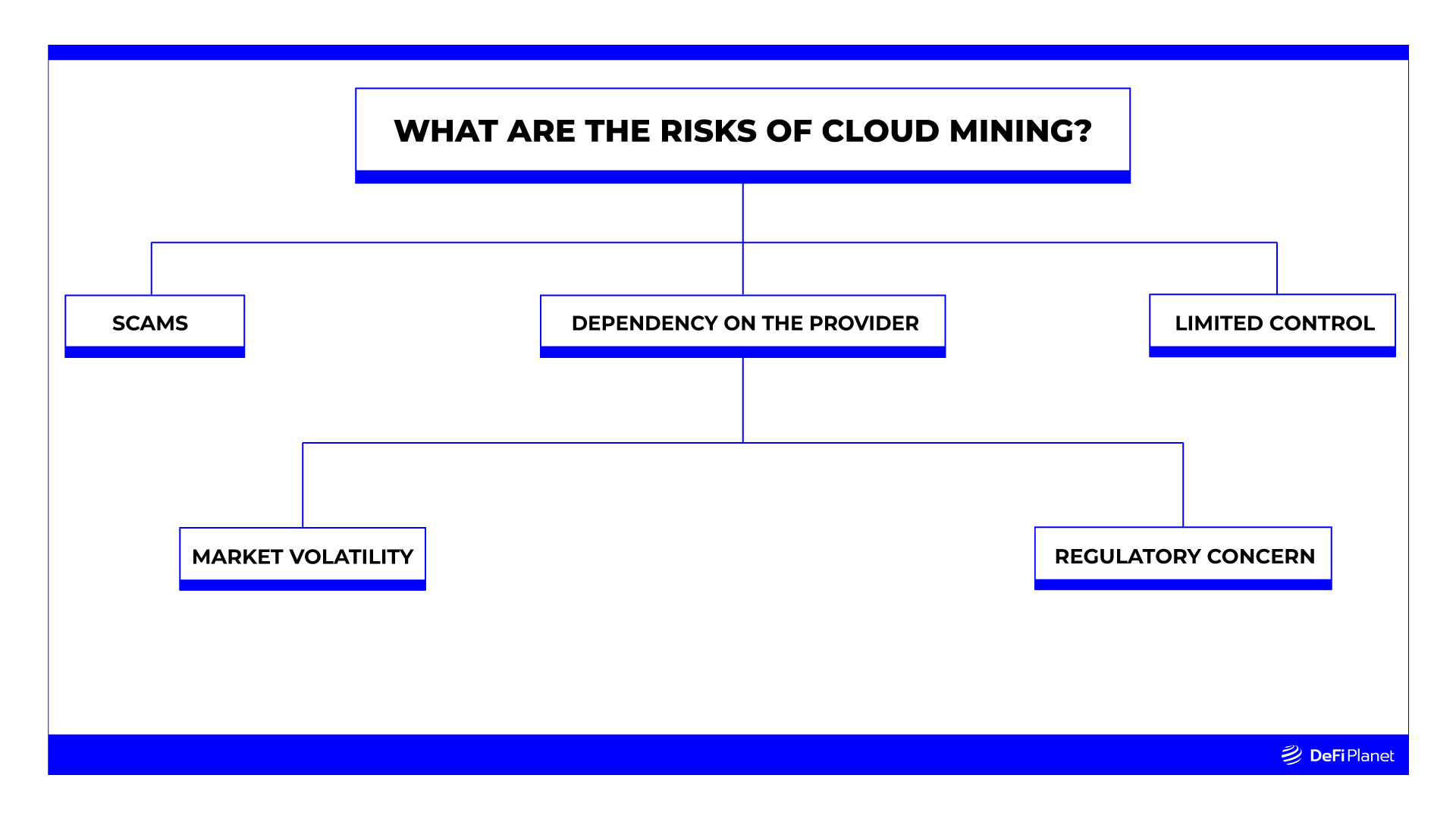
- Scams: Many fraudulent cloud mining schemes promise high returns but end up defrauding investors. It’s crucial to conduct thorough research and select a reputable cloud mining provider to avoid falling victim to scams.
- Limited Control: When using cloud mining services, investors have limited control over mining operations and cannot make adjustments to the mining software or hardware.
- Dependency on the Provider: Investors rely on the cloud mining provider to handle and maintain the mining infrastructure. If the provider encounters technical problems or goes out of business, investors may risk losing their investments.
- Market Volatility: The profitability of cloud mining can be affected by the volatile nature of the cryptocurrency market. If the value of the mined cryptocurrency decreases, the profitability of the cloud mining investment may also decrease.
- Regulatory Concerns: Cryptocurrency and mining regulations are evolving and vary globally. Miners need to understand the legal framework in their own country and the jurisdiction of the mining company to avoid potential legal issues.
Before investing in any cloud mining provider, it’s advisable to conduct thorough research and due diligence. Additionally, only invest funds that you can afford to lose to mitigate potential risks.
What Is the Minimum Deposit for Cloud Mining?
The minimum deposit required for cloud mining varies depending on the service provider and the cryptocurrency you want to mine. For example, Genesis Mining’s Bitcoin mining minimum costs range from $16 to $7,699, while Ethereum mining can require a minimum deposit of up to $500.
How Long Does It Take to Mine 1 Bitcoin in Cloud Mining?
The exact time it takes to mine 1 Bitcoin through cloud mining is hard to predict. The mining process depends on various factors, including Bitcoin’s price, electricity costs, mining rig efficiency, and other variables. Cloud mining, like other mining methods, does not offer guarantees about the timeframe required to mine 1 Bitcoin.
Is Cloud Mining Profitable?
The profitability of cloud mining depends on several factors, including the type of mining, the cryptocurrency being mined, the size of your operation, and the fees and commissions charged by your cloud mining provider.
In general, cloud mining tends to be more profitable than traditional mining because it eliminates the expenses associated with purchasing expensive hardware, cooling systems, and electricity for maintenance. So, yes, cloud mining can be a potentially profitable option.
Can You Lose Money from Cloud Mining?
Cloud mining is a risky investment with no profit guarantees. Whether you lose money or make money depends on the specific cloud mining service provider and market conditions. It’s important to carefully evaluate the provider’s reputation, terms, and historical performance before investing.
How to Calculate if My Investment Will Be Profitable?
Determining the profitability of cloud mining involves considering various factors such as cryptocurrency cost, equipment maintenance, hash rate, contract terms, and mining difficulty.
You can simplify this process by using tools like 99Bitcoins’ “Mining Profit Calculator,” which automatically factors in current cryptocurrency market conditions, including difficulty and exchange rates, after you set a few initial parameters.
Is Cloud Mining Free?
In the world of mining, nothing is truly free. While some providers offer cloud mining services without requiring upfront payments, it’s not entirely free. Instead, you pay with your time and effort, receiving only a small amount of cryptocurrency in return. As a result, paid cloud mining platforms are the more popular choice, as they allow you to earn more substantial amounts without investing your time.
How Do You Know If a Cloud Mining Platform is Legit?
Cloud mining can be legitimate, but it’s also a place where scams exist. Before diving into any cloud mining, you must be cautious and do your research. Here are some essential points to keep in mind:
- Transparency: Trustworthy cloud mining companies should openly share information about their mining equipment, location, and mining pools.
- Reputation: Investigate the company’s reputation by reading reviews and checking forums. Look out for any negative signs from other users.
- Fees: Understand the fee structure. Legitimate cloud mining services usually have maintenance fees, but these should be reasonable and clearly explained.
- Payouts: Make sure the company provides regular and reliable payouts and that you can verify your earnings.
- Contracts: Read and understand the terms of the mining contract. Be cautious of contracts that promise unrealistically high returns or have unclear terms.
Being diligent and informed is crucial when considering cloud mining opportunities to avoid potential scams.
What Are Some Warning Signs to Watch Out for in Cloud Mining
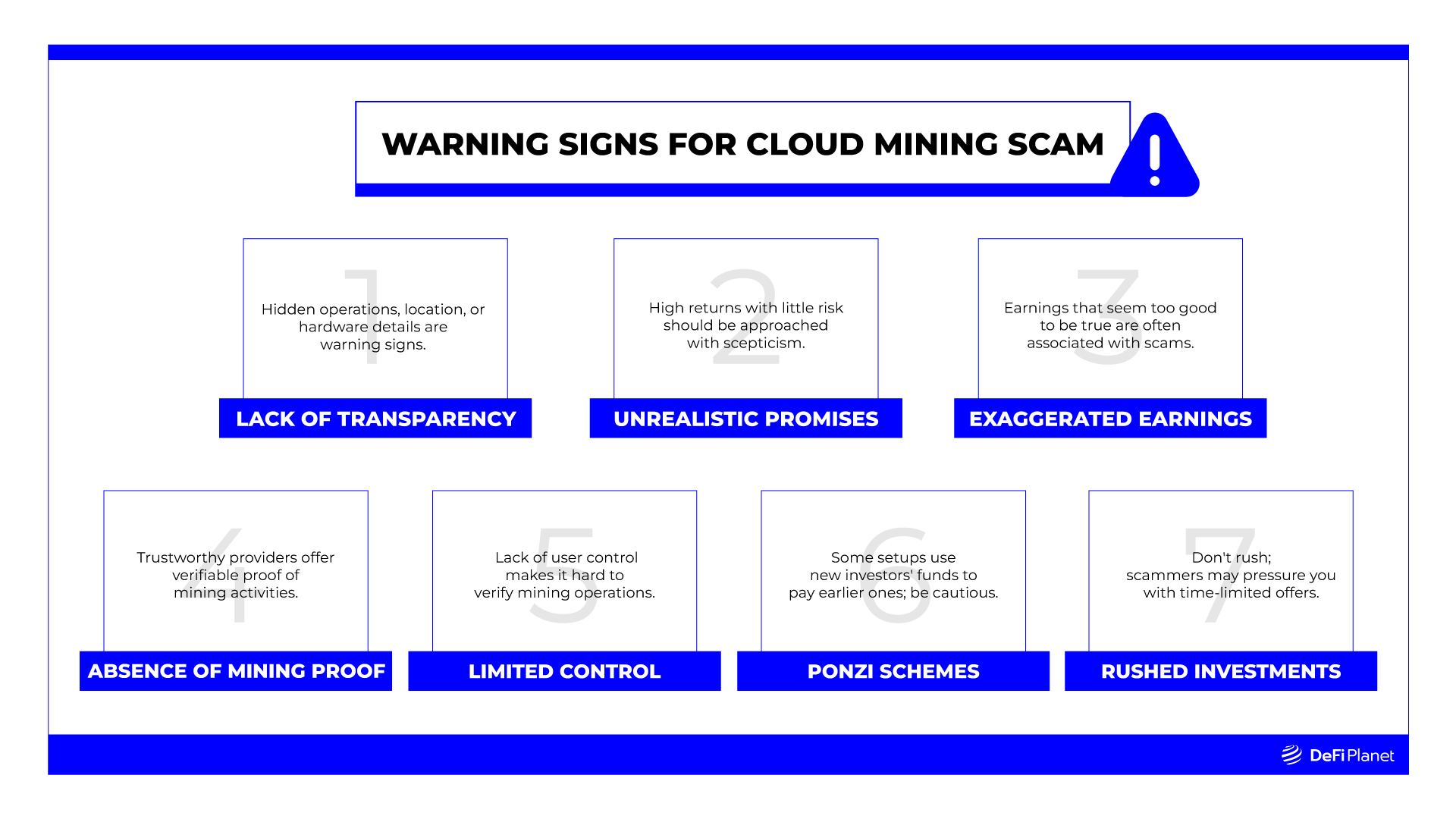
When you spot one of the following things in a cloud mining service provider, your best action would be to pause and reassess your positions.
- Lack of Transparency: If a cloud mining company hides its operations, location, or hardware details, it’s a red flag.
- Unrealistic Promises: Be sceptical of services that guarantee high returns with little risk. Cryptocurrency mining involves inherent risks and market fluctuations.
- Exaggerated Earnings: If a cloud mining service offers earnings that seem too good to be true or don’t align with market conditions, it’s likely a scam.
- Absence of Mining Proof: Scams often lack evidence of actual mining activities. Trustworthy cloud mining providers should provide verifiable information about their mining operations.
- Limited Control: In some scams, users have no control over their mining activities, making it impossible to verify if mining is occurring as claimed.
- Ponzi Schemes: Some cloud mining setups function like Ponzi schemes, using new investors’ funds to pay returns to earlier ones. Be cautious of programs relying on recruitment and referral rewards.
- Rushed Investments: Scammers may pressure you to invest quickly by offering time-limited deals or discounts. Take your time to research and make an informed decision.
Is Binance Cloud Mining Legit?
Yes, Binance Cloud Mining is a legitimate service. According to the exchange’s cloud mining FAQ, they check mining rigs and sites to minimize risks. Still, they acknowledge the uncontrollable risks associated with cloud computing, such as power fluctuations and natural disasters.
To get started with Binance Cloud Mining service, you need to sign up for an account on their website and follow their instructions.
How Do Cloud Mining Companies Profit From Their Services?
Cloud mining companies generate income primarily through the fees they charge for renting out their mining hardware or the hashrate they sell to customers. Their profits are derived from the difference between the fees they charge and the costs associated with maintaining the equipment.
In Conclusion,
Cloud mining, like any investment, comes with its own set of risks and rewards. Prospective miners should conduct thorough research when choosing providers, understand the terms of mining contracts, and stay informed about the constantly changing cryptocurrency landscape to make informed investment decisions.
Disclaimer: This article is intended solely for informational purposes and should not be considered trading or investment advice. Nothing herein should be construed as financial, legal, or tax advice. Trading or investing in cryptocurrencies carries a considerable risk of financial loss. Always conduct due diligence.
If you would like to read more articles (news reports, market analyses) like this, visit DeFi Planet and follow us on Twitter, LinkedIn, Facebook, Instagram, and CoinMarketCap Community.
“Take control of your crypto portfolio with MARKETS PRO, DeFi Planet’s suite of analytics tools.”

